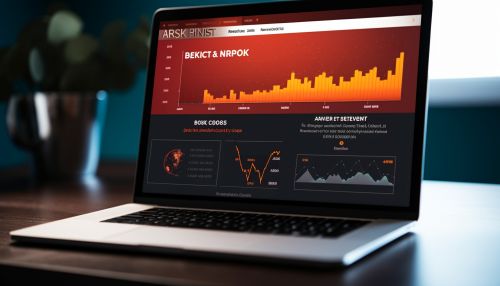Machine Learning in Financial Market Predictions
Introduction
Machine learning, a branch of artificial intelligence, has been increasingly applied in the financial markets for prediction and analysis. This article delves into the application of machine learning in financial market predictions, offering a comprehensive and detailed understanding of the subject.


Machine Learning and Financial Markets
Machine learning is a data analysis method that automates the building of analytical models. It is a branch of artificial intelligence based on the idea that systems can learn from data, identify patterns, and make decisions with minimal human intervention. In the context of financial markets, machine learning algorithms are used to predict future trends based on historical data. These predictions can be about stock prices, foreign exchange rates, market volatility, and other financial indicators.
Types of Machine Learning Used in Financial Markets
There are three main types of machine learning used in financial markets: supervised learning, unsupervised learning, and reinforcement learning.
Supervised Learning
Supervised learning is a type of machine learning where the model is trained on a labeled dataset. In the context of financial markets, this could involve training a model on historical stock price data, with the aim of predicting future prices.


Unsupervised Learning
Unsupervised learning is a type of machine learning where the model learns from an unlabeled dataset. This type of machine learning can be used in financial markets to identify patterns or anomalies in the data that may not be immediately apparent to human analysts.


Reinforcement Learning
Reinforcement learning is a type of machine learning where an agent learns to make decisions by taking actions in an environment to maximize some notion of cumulative reward. In financial markets, reinforcement learning can be used to develop trading strategies.


Applications of Machine Learning in Financial Market Predictions
Machine learning has a wide range of applications in financial market predictions. These include stock price prediction, portfolio management, algorithmic trading, and risk management.
Stock Price Prediction
One of the most common applications of machine learning in financial markets is stock price prediction. Machine learning algorithms can analyze vast amounts of historical stock price data to identify patterns and trends that can be used to predict future stock prices.
Portfolio Management
Machine learning can also be used in portfolio management. Algorithms can analyze the performance of various assets in a portfolio and make recommendations on which assets to buy or sell to maximize returns.
Algorithmic Trading
Algorithmic trading involves using automated pre-programmed trading instructions to execute trades at high speeds. Machine learning can be used to develop these trading algorithms, allowing for more efficient and effective trading.
Risk Management
Machine learning can also be used in risk management in financial markets. Algorithms can analyze various risk factors and predict potential losses, helping companies to mitigate their risk.


Challenges and Limitations
While machine learning offers many benefits in financial market predictions, it also comes with its own set of challenges and limitations. These include overfitting, lack of interpretability, and data quality issues.
Conclusion
Machine learning has the potential to revolutionize financial market predictions. However, it is important to be aware of its limitations and challenges. As machine learning continues to evolve, it is likely that its applications in financial markets will become increasingly sophisticated and effective.
